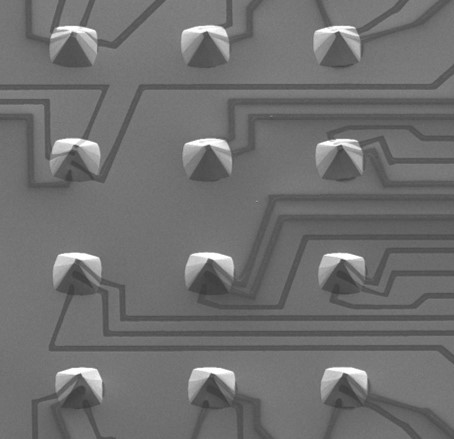MSc thesis project proposal
Wafer-level fabrication of transparent 3D microelectrode arrays
Multielectrode array (MEA) technology has been used extensively over the years to characterize the electrophysiological behavior of electrogenic cells (neurons, cardiomyocytes) in vitro [1].
Current trends in biotechnology, including organ-on-chip and organoid technology, have elicited the need and enabled the possibility to measure electrophysiological behavior of cells along the three spatial dimensions. To accomplish this, electrodes that can be embedded within tissue constructs need to be designed and fabricated.
Microfabrication strategies based on lithography have been used to create 3D electrodes [2]. At ECTM we have previously demonstrated the functionality of arrays of microelectrodes distributed in 3D space supported by silicon micropyramids [3].
In this project we propose to extend our wafer-scale fabrication approach to realize 3D MEAs on transparent substrates, which would allow optical access to the cultured tissues and make the arrays more compatible with laboratory practice.
This project is part of the Organ-on-Chip workpackage of the Moore4Medical ECSEL JU program, and it will be conducted in collaboration with the Leiden University Medical Center (LUMC, Leiden, NL).
References
[1] Soira, M. and A. Hai, Multi-electrode array technologies for neuroscience and cardiology. Nature nanotechnology, 2013. 8: p. 83-94.
[2] Choi, J.S., et al., Recent advances in three-dimensional microelectrode array technologies for in vitro and in vivo cardiac and neuronal interfaces. Biosens Bioelectron, 2021. 171: p. 112687.
[3] Revyn, N., et al., Recording neuronal activity on chip with segmented 3D microelectrode arrays. IEEE MEMS 2022 (link).
Assignment
This experimental project will involve:
- An extensive review of the state-of-the-art in 3D MEA structures and fabrication;
- Fabrication of transparent 3D microelectrode arrays;
- Functional testing of the 3D MEA’s and implementation in in vitro setting;
- Reporting.
Requirements
You are a motivated student and you like to work in a multidisciplinary setting. A hands-on attitude will be important in this assignment, where a high degree of independency and problem solving capabilities will be required.
You have a background in electronics, physics, mechanical or biomedical engineering.
Proper English communication skills and a pro-active attitude are expected.
Contact
dr. Massimo Mastrangeli
Electronic Components, Technology and Materials Group
Department of Microelectronics
Last modified: 2025-07-30
